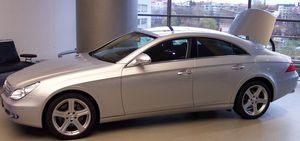.
Coupe
A coupé (from the French couper to cut) or coupe is a car body style with a close-coupled interior offering either two seats or 2+2 seating (space for two passengers up front and for two occasional passengers in the rear). Through the 1950s convertible models were sometimes called convertible coupés, but since the 1960s the term coupé has generally been applied exclusively to fixed-roof models. Coupés generally, but not necessarily, have two doors, although automobile makers have offered four-door coupés and three- and five-door hatchback coupés, as well. Modern coupes generally have the styling feature of frameless doors, with the window glass sealing directly against a weatherstrip on the main body.
The SAE distinguishes a coupé from a sedan primarily by interior volume; SAE standard J1100 defines a coupé as a fixed-roof automobile with less than 33 ft³ (0.93 m³, 934 L) of rear interior volume. A car with a greater interior volume is technically a two-door sedan, not a coupé, even if it has only two doors. Some car manufacturers may nonetheless choose to use the word coupé to describe such a model, e.g., the Cadillac Coupe de Ville.
It is becoming more of a marketing term for automotive manufacturers, calling any two doors (or three door) a coupé. This is mostly due to the fact that coupés in general are seen as more sporty than sedan, hence a coupé would be perceived as sportier than a 2-door sedan. Lately, some four door sedans are being marketed as coupés, notably the Mercedes-Benz CLS-Class. Marketing divisions from other companies are set to follow Mercedes' example, such as Audi with its rumoured 4-door coupé variant of the upcoming A5.
Pronunciation
In Europe (including the UK), the original French spelling, coupé, and a French pronunciation, koo-pay, are often used (/'kuːpeɪ/). The stress may be on either the first or second syllable; stressing the first syllable is the more Anglicized variant. Speakers of North American English pronounce coupé as coop (IPA: [kuːp]) and spell it without the acute accent. A very American example of usage is the hot-rodders' term "Deuce Coupe" used to refer to a 1932 Ford.
History
In the 19th century a coupé was a closed four-wheel coach, cut (coupé) to eliminate the forward, rear-facing passenger seats, with a single passenger seat behind the driver, who sat on a box (illustration, right). Commonly, a coupé had a fixed glass window in the front of the body, protected from road dirt by a high curving dashboard.
During the 20th century the term was applied to various close-coupled automobiles. Through the 1950s many automakers offered several varieties of coupé
- Club coupé
- a coupé with a larger rear seat, which would today be called a two-door sedan.
- Business coupé
- a coupé with no rear seat or a removable rear seat, intended for traveling salesmen and other vendors who would be carrying their wares with them.
- Opéra coupé
- a coupé with rear seats that are mounted in the sides of the body and fold downward for use.
- Sport coupé or berlinetta
- a uniquely styled model with a sloping roof, sometimes sloping downward gradually in the rear in the style known as fastback.
- Four-door coupé
- a sedan with classic coupe-like proportions. The designation was first applied to the Rover P5 from 1962 until 1973 but was revived as recent as 2004 by the Mercedes-Benz CLS.
- Combi coupé
- a body type from SAAB combining the coupé lines with large loading capacity.
With the growing popularity of the pillarless hardtop during the 1950s some automakers used the term coupé to refer to hardtop (rigid, rather than canvas, automobile roof) models and reserved the term sedan for pillared models. This definition was by no means universal, and has largely fallen out of use with near-demise of the hardtop. Similarly, the Rover P5 sedan came in a body style with a lower roof that was called a coupé. Technically, it was cut, as the original definition required, but was not a car body made shorter thereby.

